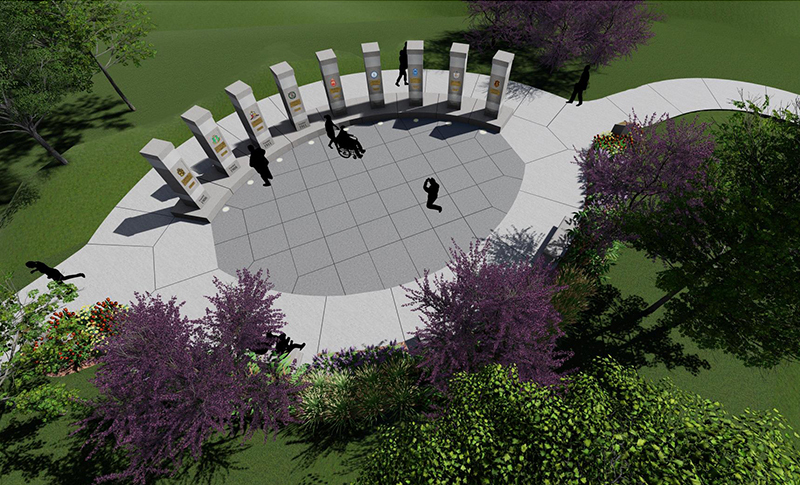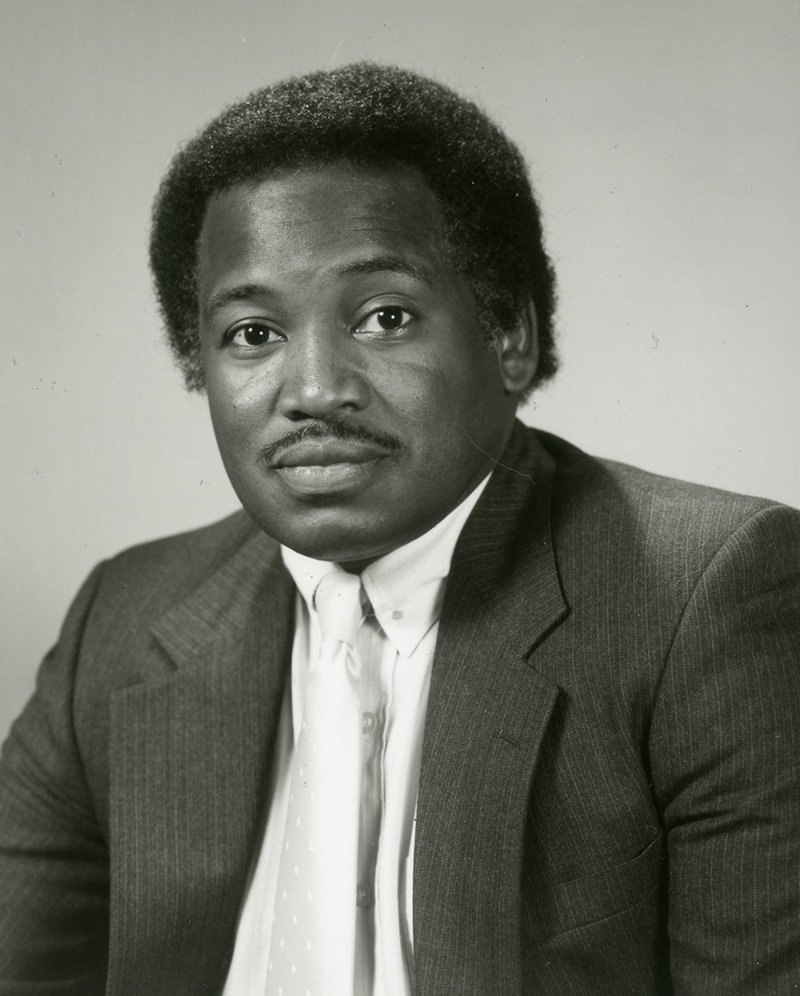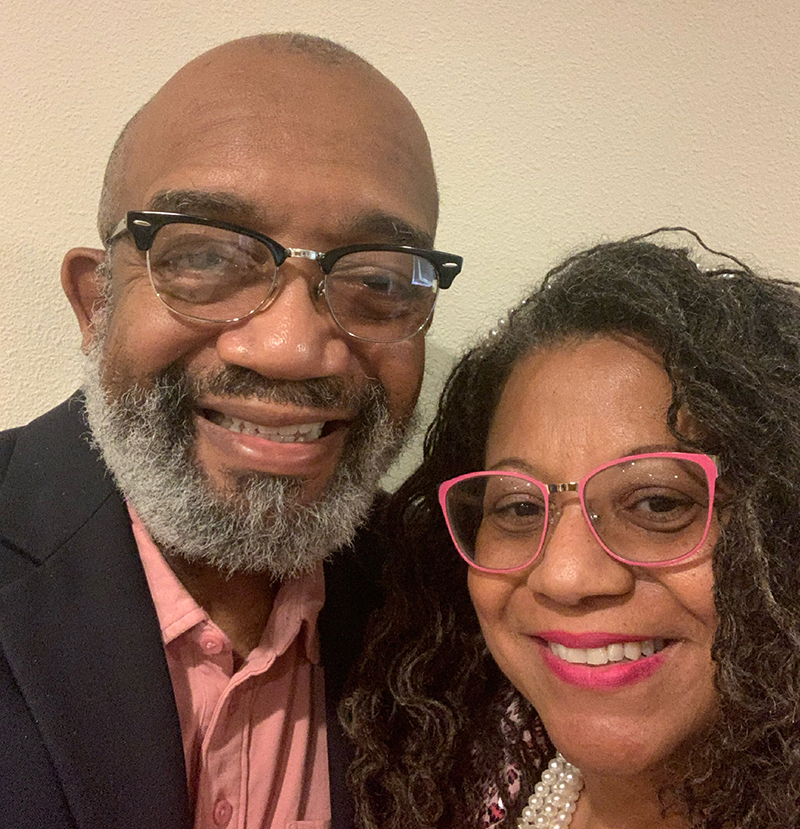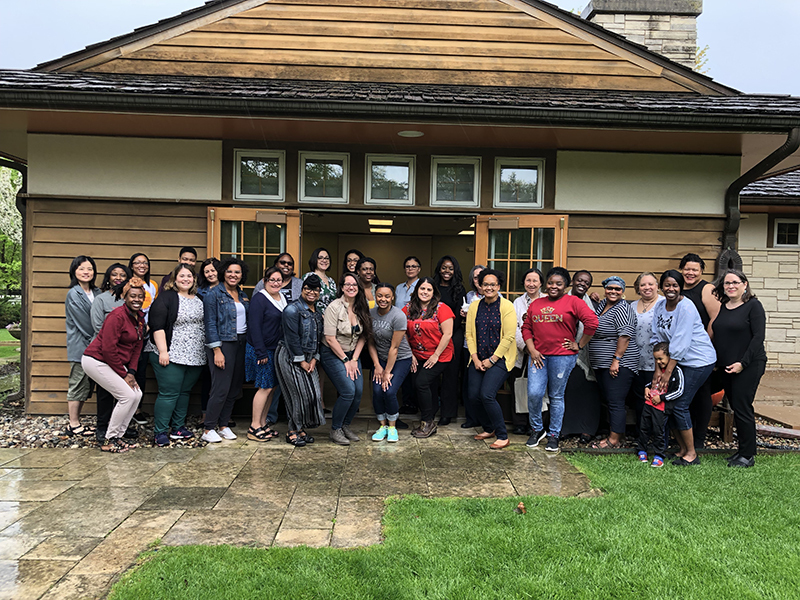Building projects begin, wrap up this summer

A May 20 drone image by the general contractor, Neumann Brothers, shows progress on a new north concourse to Jack Trice Stadium, east and west hillside areas and site preparation for a 49,000-square-foot turf and paved north plaza to the stadium. To the right is the five-level Sports Performance Center. Photo courtesy of facilities planning and management.
The global pandemic has extended delivery times on many kinds of building materials, but the project management team in facilities planning and management is persevering through an unpredictable time. Summer typically brings a noticeable uptick in construction and maintenance projects around campus. Below is a short summary of some of what's scheduled.
Contained to summer
Parks Library southeast window wall
The grid system for the four-level, nearly 40-year-old curtain wall window system will remain intact, but new spacers, gaskets and glass panes will be installed. Originally, the plan was to focus on leaking seals and gaskets, but replacement parts aren't available due to the age of the system. The project includes replacing the five exterior doors in the grid, but the library will remain accessible from the south. The $2.1 million cost will be funded with university capital renewal funds.
Enrollment Services roof
A new clay tile roof for the Enrollment Services Building will retain the architectural integrity of the 114-year-old building, among the oldest on campus. Ludowici, the company providing the new tiles, also made the originals. Some on campus might recall a 1982 roof project at what then was Alumni Hall. The 1905 roof tiles were removed and reinstalled after some repairs beneath them.
The roof skylight, which protects original leaded glass, will be replaced, and the project includes new paint for the window exterior trim and distinctive white columns. Abatement for asbestos and lead paint began in April; the project should wrap up by early August. A portion of Lot 65 will be closed during the construction. The project budget is $1.25 million.
Office renovation on Haber Road
Office spaces, a large training room, corridors and restrooms in the east half of the Firemanship Training building will get new flooring, lighting and paint before the leadership team for finance service delivery moves in toward the middle of fall semester. The roof also will be replaced. A garage on the building's north side and small west office area are not included in this project. The renovated interior will include new office furnishings and additional work stations for finance delivery team members to train on and use as needed. The project budget is $795,000.
A safer intersection
Improvements to the University Boulevard-Haber Road intersection will replace the traffic signal and poles, add sidewalk on the north side of University and add a pedestrian/bicycler cycle to the railroad underpass traffic rotation, when individuals request it. The project also will add sidewalk along the west side of Haber from transportation services to the Frederiksen Court student apartments. The project will require lane closures on University and temporary closures to Haber this summer (but even when "road closed" signs go up on Haber at 13th Street, drivers will have access to transportation services).
Central plaza

Top-view rendering of plaza
A plaza promoting the nine historically Black fraternities and sororities (National Pan-Hellenic Council) will be constructed on the front west lawn of the Memorial Union. Work will begin in late June. The initiative is a partnership among Iowa State's NPHC chapter, dean of students office and the division of student affairs. It's part of a national effort to establish a place on college campuses that recognizes each of the member organizations and serves as gathering space for events and visiting members. Construction is scheduled to wrap up around the middle of fall semester. Private gifts and division of student affairs seed dollars will fund the $400,000 project.
Friley Hall roof
2021 is the first of a two-summer project to replace Friley Hall's slate roof with asphalt shingles and replace gutters and downspouts as needed. Flat rubber roofs areas also are being redone. This month, the work begins at the archway near the west end of Friley, moves east and then north through the Friley loading dock area across from Lake LaVerne. Phase 2 starts next summer in the vicinity of Friley Windows dining center and continues north to the end of the residence hall. This project also includes all work on the top floor dormers -- window replacement, roof and siding. The dormer windows weren't replaced in a three-summer window project (2018-20). The $5.9 million cost is covered by dormitory system improvement funds.
Sidewalk lighting
The second of a two-summer sidewalk lighting project will start in early July and wrap up early in the fall semester. It will add another 40 LED lights in a dozen locations identified during the annual campus safety walks organized by Student Government, ISU police and facilities staff and through employee observations submitted over several years. Five of the new lights will be solar powered and funded by Student Government, the others through utilities funds. The first phase added a similar quantity but also converted 125 sidewalk lights from the high-pressure sodium lamps to LEDs.
Classroom renovations
- Several smaller general university classrooms (1801, 1805, 1811 and 1813) in the southeast corner of Gilman Hall's first floor will receive new seating, flooring, painting and window shades, where applicable.
- Carver Hall rooms 0002 and 0004 will be renovated into a single room with furniture and technology to support team-based learning.
- Gerdin Hall auditorium 1148 will receive fresh paint and new carpet and seating, and ceiling tiles will be cleaned.
Wrapping up
Sports performance center
The $90 million athletics project, which includes a new five-level building named for the Richard and Joan Stark family, demolition of the Olsen Building, ground floor renovations and a north addition to the Jacobson Building for some former Olsen Building functions, an elevated north stadium concourse and a north plaza outside the stadium, should wrap up this summer for use this football season. Some areas on lower levels of the Stark facility are in use now, and the recruiting offices on level 2, academic success center on level 3 and dining area on level 4 are nearing completion. The concourse extension has created a continuous pedestrian walkway around the stadium. The relocation of the Cyclone team locker room to the first floor of the Stark facility added 30 feet to the tunnel that connects it to the field. Work at the site began in April 2019.
Ross Hall fire recovery
Surface, equipment, air and duct cleaning from the Feb. 22 fire in a first-floor closet are complete. Current projects include tandem installation of a fire alarm system and ceiling tiles throughout the building and refinishing door and wall surfaces on the first floor. In June, IT teams will reinstall computers as offices become accessible to them. The goal still is to reopen the building around July 1. Nearly 65% of the $3.75 million project budget is for cleaning; the rest is for repair projects and the new fire alarm system.
Gelato store in the MU
Construction is all but complete on ISU Dining's new gelato store on the ground floor of the Memorial Union, east of Panda Express. A few finishing touches are left, including art and IT installation. When it opens later this summer, the store will provide a second outlet for ISU Dining's own gelato product, made daily in the Friley creamery. Buy it now at The Roasterie counter in the Hub (which will continue to feature it, too).
Genetics Lab demo
The 88-year-old Genetics Laboratory complex was demolished in March. Pammel Drive closed May 24 for two weeks at the site for one of the final pieces of the $890,000 project: removal of an underground steam tunnel across the road to the building. Like the former Insectary site to the east, this plot will be seeded with native plants for a habitat for migrating butterflies.
Getting started
Veterinary Diagnostic Laboratory
Following underground utility installations the past month, the underground level is being dug for the state's new diagnostic lab on the southwest side of the College of Veterinary Medicine. The $75 million project, which includes $63.5 million in state support over six years, is scheduled for completion before fall 2023, and will partially replace the current dignostics lab, which operates within the college facility. Some functions will remain in the college building. Private gifts ($4 million) and university funds ($7.5 million) complete the funding package.
Gateway bridge
The construction bid was to be awarded this week, but significant progress on the athletics department's $10 million pedestrian walkway above University Boulevard east of Jack Trice Stadium likely begins after the 2021 football season.

Working in sections day by day, the crew replacing the roof of Enrollment Services Building removes the 100-year-old clay tiles and replaces roof boards weakened by age or moisture. Photo by Christopher Gannon.
New policy for visiting scholars is in place
A new policy implemented last month establishes expectations for hosting visiting scholars at Iowa State, including approval and registration processes.
Visiting scholars typically are faculty affiliated with another university who spend a period of time on campus collaborating on research projects or observing research, instruction or extension and outreach activities. The designation does not include invited speakers or advisory board members, students or individuals who otherwise would be classified as post-docs.
"Iowa State attracts many scholars from around the world each year," said senior vice president and provost Jonathan Wickert. "These visitors come to campus to pursue research and scholarly activities alongside our outstanding faculty, exchange innovative ideas and experience the diversity of our academic community."
Iowa State faculty often are visiting scholars themselves when they visit other institutions as part of Fulbright awards or through professional development assignments.
The need for greater oversight of visiting scholars has received increasing attention from federal research sponsors. Wickert noted that establishing a more rigorous approval and registration process also protects the university's interests, including the intellectual property of faculty and staff and the integrity of federally funded research projects.
Requirements in the policy
Under the new policy, visiting scholars are required to have an active ISU employee as their individual host and to receive approval from the employee's department chair or dean as the administrative host. Visits of 14 days or longer also must be approved by the office of the senior vice president and provost.
Hosts are charged with making sure that the visit, and activities conducted during the visit, comply with university policies, including conflict of interest and commitment, export control, behavior expectations, and visa authorization and required health insurance for international guests. Hosts also are responsible for assisting visiting scholars with securing a university ID, email and network access, space and use of university equipment, and completing laboratory safety training if applicable.
Questions regarding the policy may be directed to Brenda Behling at bkbehli@iastate.edu or 515-294-8236. An FAQ document is available on the provost's website.
Crowdfunding effort honors minority student advocate George Jackson
If you were a student of color at Iowa State in the 1980s or '90s, chances are good your college experience was better because of George Jackson. A lifelong advocate for underrepresented students, including 31 years in Ames, Jackson was known for his no-boundaries effort that helped hundreds of students overcome hurdles. He served as director of the former office of minority student affairs (1978-88), assistant vice president for student affairs (1988-94), special assistant to the provost (1994-98) and assistant dean in the Graduate College (1988 to his retirement in 2009).
Jackson passed away in 2016 at the age of 75, and a memorial fund his family established then expanded in scope this spring with the goal of endowing support for three purposes:
- Undergraduate scholarship for a first-year, first-time African American student (Account 2700528)
- A fund from which to draw emergency grants to help underrepresented students remain in school at any point in their ISU career (Account 2705984)
- Programming and events at the Black Cultural Center, 517 Welch Ave., which opened in fall 1970 and has carried Jackson's name since May 2017 (Account 2700716)
To jumpstart fundraising, the ISU Foundation launched a crowdfunding page June 2 that will stay active for 30 days. When it closes, a giving website will remain available at least through 2021. Assistant vice president for development Rob Kinsey said employees also can make gifts through payroll deduction using this form (designate the 7-digit account on the form).
"We want to make sure people remember -- or learn about -- Dr. Jackson's impact on campus," Kinsey said.
The Jackson legacy

George Jackson
When Iowa State hired Jackson in 1978 to help recruit and retain minority students, the Cyclone student body included fewer than 500 non-white students. A decade later, that number was close to 1,300. Working with admissions and financial aid staff, he recruited undergraduates from Chicago, Kansas City and St. Louis. Later, in his role in the Graduate College, he traveled further south to recruit high-achieving students from historically black colleges and universities to Iowa State.
Perhaps more significantly, he installed programs and services to help students of color succeed once they enrolled. He developed the Summer Enrichment Program and George Washington Carver scholarship for incoming minority freshmen and the George Washington Carver doctoral fellowship. He established an emergency loan fund and a leadership program specifically to serve minority students. He wrote the first successful grant applications for two of the federal TRIO programs Iowa State participates in today: Student Success Services (1980) and Ronald E. McNair Post-baccalaureate Achievement (1995). He initiated the structure of placing a multicultural liaison officer in each college. He solicited funding for the Graduate Minority Assistantship Program (GMAP) and its subsequent GMAP research symposium, both of which now carry his name.
Thelma Harding, coordinator of diversity recruitment and retention in the Graduate College, worked with Jackson from the time she arrived at Iowa State in January 1991 in a split appointment between the college and the division of student affiars. She learned so much from observing and listening to how he talked to students -- validating their experiences -- and to faculty, often urging them to work harder on behalf of the graduate students they had recruited who needed their guidance.
"He always had students No. 1, and helping them complete their degrees was the top priority," Harding recalled. "I can recall him telling more than one faculty member, 'I'm not asking you to lower your standards. I'm asking you to increase your efforts.'"
Jackson published many articles to help faculty and colleagues assist first-generation Black and other underrepresented students. And many semesters during his years in student affairs began with a Jackson-penned "open letter to minority freshmen" in the Iowa State Daily. He reminded new students they didn't arrive at Iowa State with all the answers, but they would need to work hard to succeed and recognize when they needed help. "Visit the office of minority student affairs and meet the staff," he implored them. "We can't help you find answers if we do not know your needs."
And when they succeeded, Jackson celebrated their achievements, big and small, with certificates of achievement, banquets and more letters in the newspaper.
A pledge to remember

Deland and Evie Myers
Deland and Evie Myers of Statesville, North Carolina, were instrumental in recharging Jackson's five-year-old fund at the foundation. As part of the 40th anniversary of their Iowa State degrees, they honored the pledge they made to Jackson eight years ago to create an endowed fund honoring him. The Myers met as students at Iowa State in 1980, later married and returned to Ames from 1989 to 2007. Deland became a tenured faculty member in the food science and human nutrition department and the first faculty director of the Carver Academy, which provided support services to undergraduates with George Washington Carver scholarships. Evie, who has degrees in elementary education and law, worked for Jackson for a year coordinating programs until the Myers' second child was born, consulted for the university for several years and later returned as associate director of equal opportunity and diversity.
"[George] had this passion for seeing African Americans be successful. He was instrumental in helping so many of us," Deland said. "He stood up for us when it was difficult, he challenged the administration to look at things differently."
And many times, Jackson engineered the solution himself.
"So many former students have their own story about the care George Jackson gave us," he said.
The Myers' especially rough spot hit in 1983 as Deland was defending his doctoral research and Evie was attending law school in Iowa City. At a time when a thesis wasn't stored in a computer and the researcher paid a typist to produce the document, Deland's committee's request that he rework a small piece of research threatened to derail his Ph.D. They didn't have $200 for more of the typist's time, and Deland had a job waiting for him at Pillsbury in Minneapolis. He was ready to leave Iowa State with just his master's degree.
"When Black students had a problem, they went to Dr. J.," Evie said. "So I explained our situation and he told Deland, 'You're going to get this Ph.D., you're going back to the lab to redo what they asked and I'll work on finding funds to pay the typist. You don't worry about that part.'"
And he did. Deland is quick to point out this was years before Jackson received a second appointment in the Graduate College.
"His job was to help undergrads, but he helped all students. It didn't matter to him," he said.
Evie noted that Deland's successful career in food science, which included patented work for Pillsbury, president's term at the American Oil Chemist Society and an endowed professorship at Prairie View A&M University, Texas, all happened "because Dr. Jackson made sure all multicultural students mattered at Iowa State University."
Deland recalled a Jackson expression: "All planes can fly, some just need a longer runway."
Some students take longer to acclimate to college, and Jackson was determined to provide what he could -- mentoring, direction, tutoring, extra funds -- "to get them to where they needed to be," Deland said.
The Myers' gift will help set up the emergency funds account.
"Iowa State is a tremendous university. We got our degrees there, grew our professional lives there." Evie said. "It's a university that welcomed George Washington Carver when not many universities would. We want to make sure it stays that way, that there always are opportunities for African American students. One way to do that is to endow this fund that helps students complete their degrees.
"And what better way to do it than to include the name of George Jackson, who embodied all of that?"
The Myers said their prayer is that many people contribute to the fund to "keep alive the legacy of Dr. George Jackson to help other multicultural students graduate from Iowa State and realize their dreams."
What to keep in mind about post-pandemic well-being
A moving forward mindset
Join local counselor Jason Haglund for two upcoming virtual sessions on post-pandemic mental health:
- "Moving from Confusion to Thriving: Life in an (Almost) Post-Pandemic World," June 17 (2 p.m.)
- "Welcome Back, Kind Of: The Age of Starting Over," June 23 (10 a.m.)
Many of the outward signs of the COVID-19 pandemic are going away, but its inward impact -- the emotional and mental health effects of the past 14 months -- won't fade as easily.
In a recent seminar held by the Professional and Scientific Council, ISU WorkLife and WellBeing and Student Wellness dietician Lisa Nolting talked about post-pandemic wellness. Here are some tips from the presentation.
Be kind to others…
When university offices and workplaces resume full occupancy this summer, be sure to respect that COVID-19 affected people differently, said Stephanie Downs, senior WorkLife and WellBeing coordinator. Some may still be grieving losses. Others may feel guilty that they enjoyed working from home.
"I think we just have to remember that while we all have experienced somewhat the same thing, we've all experienced it in unique ways," Downs said.
... and be kind to yourself
Extend the same compassion to yourself, said Cris Broshar, WorkLife and family services coordinator. Set realistic expectations and try to remain flexible, she said. Cut yourself a break if disrupted eating or exercise patterns caused changes in weight or fitness, Nolting said.
"That's OK. We've been in a pandemic. Your body is living in the same pandemic you are," she said. "In times of stress and uncertainty, our bodies are in survival mode. Our mental well-being, our physical well-being, our emotional well-being, all those things are interconnected. You can't just mess with one of those things and expect that everything else is going to be fine."
If you're interested in making better food choices, consider ISU WorkLife and WellBeing's "Am I Hungry?" mindful eating series, Downs said. Two cohorts of the 8-week program ran this spring, and the sessions will be offered again this summer and fall.
Recognize the positive
Take stock of what's been constructive during the pandemic. Nolting said she hopes to see the trend of increased home cooking continue, and Downs cited the renewed appreciation for connecting with families and friends. Broshar said she's been encouraged by resiliency.
"We've seen we can face extraordinary situations and circumstances, and we're still here and still working and trying to find ways to move forward. That's given me -- and a lot of others I've spoken with -- a lot of hope," Broshar said.
Be mindful
Broshar said another pandemic positive has been a focus on mindfulness and being present.
"It's something people always say. It's something I've always said and tried to practice. But this pandemic really has driven home the importance of enjoying a moment for what it is without it being shaped by some past or future event," she said.
ISU WorkLife and WellBeing has been offering a variety of mindfulness sessions. Registration is open for the 15-minute Mid-Morning Mindfulness sessions on Tuesday and Thursdays at 10 a.m. that resume June 15. Archived sessions also are available. Psychology professor and Zen monk Douglas Gentile led a 13-week series on meditation this spring will begin again June 14 (Mondays, 2:30-3 p.m.). Register online for the summer series, which also will be offered this fall.
Help available
Don't hesitate to seek out help when needed. Numerous local, state and national resources are available, including the Iowa Concern Hotline for information and referrals and Your Life Iowa for mental health crises. The employee assistance program offers counseling, life coaching, financial and legal consultations, and more.
For a self-help option, check out Therapy Assistance Online, a collection of interactive mental well-being sessions and courses.
To learn about how to talk to others who are struggling and encourage them to seek help, take the Kognito at-risk mental health training available on Learn@ISU. It's designed for faculty and staff and their interactions with students, but the lessons would apply in other situations, Downs said.
"There's a lot out there to really help people," she said.
'We know what we need': SISTER connects women of color

A group photo taken at SISTER's May 2019 retreat. Photo courtesy of SISTER.
Three years ago, six women in Iowa State's delegation to the National Conference on Race and Ethnicity met for dinner on the last night of the conference in New Orleans.
"We were having the time of our life. It was such an uplifting space and everyone was so jubilant," said Audrey Kennis, retention coordinator for the College of Agriculture and Life Sciences. "But there was also this sadness that came over us. It was hard knowing we weren't going to be doing this again."
That realization gave way to another thought: Why not do it again? Not at the next year's conference, but on a regular basis on campus.
"Just like we try to bring back best practices from the conference, we could bring this organic space we developed, a space for women of color to be together in community," Kennis said.
Creating community
Attempting to recreate in Ames the spirit of that dinner in New Orleans led to Supporting Inclusive Spaces Through Experience and Recognition (SISTER), a group of more than 80 faculty and staff who identify as women of color who gather monthly on campus over the lunch hour. It's a chance to connect and share stories, a too-rare prospect for affirmation and support on a mostly white campus. Many SISTER members are the only women of color in their unit, Kennis said.
"Often, no one is addressing our needs and concerns, so it's important for us to use our agency to create something that speaks to our lived experiences in a way that we don't get in other spaces," she said. "It's important that we're centering women of color. It's important to our well-being and our quality of life to find and see other people who can relate to things we're experiencing in our office spaces."
Meeting locations rotate, as two members volunteer to host each gathering by providing the food and organizing an activity. Sessions can be professionally or personally focused and have included a wide variety of topics -- cooking demonstrations, emergency preparedness, goal-setting, Zumba and the impact of Selena, for instance. Ashley Garrin, assistant director of the Ronald E. McNair Postbaccalaureate Achievement Program, said one of the most powerful presentations was a panel of longtime Iowa State faculty and staff who are women of color.
"The things they said about their resiliency and how things have changed, it was just amazing. People were definitely tuned in," said Garrin, who along with Kennis serves on the group's leadership team.
Many SISTER members are in positions at Iowa State that involve building communities to help students succeed but struggle to find the sustenance of community themselves, Garrin said. The monthly SISTER gatherings offer that missing communal experience, building relationships across campus that benefit members and in many cases their students, too.
"It's almost like coming together as a village. And we're not just helping ourselves, it's helping others, too," she said.
Self-made space
Kennis and Garrin both see SISTER as being valuable for retaining employees who are women of color and possibly as an aspect to note in recruitment.
"I think at this point, it's not about waiting around to figure out how the university is going to retain me," Garrin said. "It's about how can I retain myself in this space. That's part of our approach. We know what we need, and so we're going to make that space and make it work for us instead of suffering through."
The growth of the group in less than three years -- almost entirely on word-of-mouth promotion -- shows how much women of color were yearning for an opportunity like SISTER, Kennis said.
"We don't have to beg people to do this. You'd think you'd have to be asking people to sign up, but everyone is excited to do it," she said. "I think there's a lot of value because people get a chance to share a bit of themselves they normally don't get to share on campus."
Faculty and staff -- or their spouses -- interested in becoming a member of SISTER can contact anyone on the leadership team to join.
New partnership expands ISU access to affordable child care
Chamber surverying child care needs
Addressing the availability and affordability of high-quality child care is a key priority at ISU, but it will require multiple strategies and solutions, as well as collaboration with local government and businesses.
The Ames Chamber of Commerce is conducting a survey on the community's post-pandemic needs and challenges for providing care to children ages infant through 12 years old. The online survey should take less than 5 minutes and is available online through June 11. Email WorkLife and family services with any questions about the survey.
Students, faculty and staff have more options for affordable quality child care thanks to a new partnership to offer income-based fees at Eagle's Loft Early Learning Center.
Eagle's Loft, at 2715 Dayton Ave. in northeast Ames, is a 117-child center operated by Bright Horizons -- the same company that runs the ISU Child Care Center at Veterinary Medicine. Starting June 1, ISU employees, post-docs and students who enroll their children at Eagle's Loft have access to university-subsidized sliding-scale tuition rates comparable to the fees at University Community Childcare and the Vet Med center.
Eagle's Loft is open Monday through Friday from 7:30 a.m. to 5:30 p.m. and has immediate openings for all ages, six weeks through 12 years. A full-day summer camp option is available for school-age children. Spaces are available on a first come, first serve basis. Families interested in summer or fall enrollment should inquire now to secure a space.
Iowa State's arrangement with Eagle's Loft is an extension of its contract with Bright Horizons for the Vet Med center and includes the same requirements for service quality, staffing, security and safety.
The expanded partnership comes at a good time, as many families are seeking child care with ISU employees who have been working remotely required to return to in-person workplaces by July 1, said Cris Broshar, WorkLife and family services coordinator.
"My hope is that for some of those families, ISU’s partnership with Eagle's Loft will cross child care off their to-do list," Broshar said.
To inquire about enrollment or schedule a tour, complete the online inquiry form. For questions about the center, call (515) 232-8299 or email eagl@brighthorizons.com.
New benefit program finds relief for student loan repayment
Paying off student loans can feel overwhelming, but the light at the end of the tunnel could be getting a little brighter for Iowa State employees. A new benefit option can help employees navigate complex federal and state programs to lower their student loan payments and potentially get some of the debt forgiven.
Savi, a service offered by TIAA that launched at ISU June 1, sorts through more than 150 state and federal assistance options to propose personalized repayment and forgiveness plans based on income, family size, debt amount and employment history. The suggestions can bring significant relief, with users averaging projected savings of about $157 per month in 2019, according to Savi.
At the free "DIY" level, employees receive links to the forms needed to apply for the recommended programs and take it from there themselves. At the "essential services" level, which costs $60 per year, Savi acts as a student loan repayment concierge, processing all the application forms, employer verification and annual recertifications. Essential services clients also receive ongoing monitoring and one-on-one customer support from student loan experts.
Navigating intricacies
The federal Public Service Loan Forgiveness (PSLF) program is one of the most common forgiveness options Savi recommends. PSLF forgives the remaining loan balance of a qualifying government and nonprofit employee who makes 10 years of income-based payments on a federal Direct Loan. At the essential services level, Savi can help borrowers satisfy the intricate PSLF rules that have caused more than 97% of forgiveness applications to be rejected since borrowers first started to be eligible in 2017.
The complexity of complying with PSLF has been a long-standing complaint, and university human resources (UHR) gets occasional requests for assistance with the program, said Ed Holland, UHR benefits director. Savi can help employees establish a PSLF-qualifying repayment plan or review existing plans to ensure they're on track and potentially lower the payments. Offering Savi also raises awareness for the forgiveness program, Holland said.
"We know there are many employees who have no idea they're eligible," he said.
How to get started
Employees can sign up for Savi online any time and don't need to be a TIAA client. For a commitment-free assessment, employees need to supply their social security number, the first page of their most recent tax return and login information for any loan servicing companies they are using.
For more information, join a Zoom webinar on June 15 (1 p.m.) or June 24 (11 a.m.).
